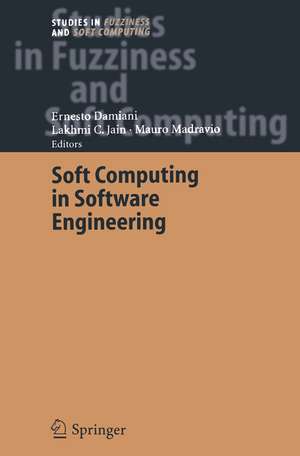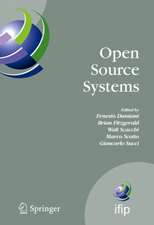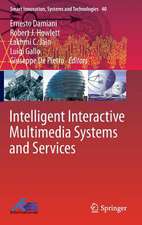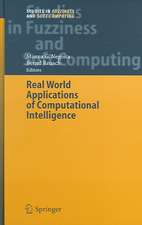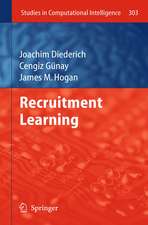Soft Computing in Software Engineering: Studies in Fuzziness and Soft Computing, cartea 159
Editat de Ernesto Damiani, Mauro Madravioen Limba Engleză Paperback – 23 noi 2012
| Toate formatele și edițiile | Preț | Express |
|---|---|---|
| Paperback (1) | 945.92 lei 6-8 săpt. | |
| Springer Berlin, Heidelberg – 23 noi 2012 | 945.92 lei 6-8 săpt. | |
| Hardback (1) | 952.26 lei 6-8 săpt. | |
| Springer Berlin, Heidelberg – 9 iul 2004 | 952.26 lei 6-8 săpt. |
Din seria Studies in Fuzziness and Soft Computing
- 20%
 Preț: 999.85 lei
Preț: 999.85 lei - 20%
 Preț: 653.06 lei
Preț: 653.06 lei - 20%
 Preț: 872.98 lei
Preț: 872.98 lei - 20%
 Preț: 930.57 lei
Preț: 930.57 lei - 20%
 Preț: 1051.00 lei
Preț: 1051.00 lei - 20%
 Preț: 992.44 lei
Preț: 992.44 lei - 20%
 Preț: 655.85 lei
Preț: 655.85 lei - 20%
 Preț: 1001.86 lei
Preț: 1001.86 lei - 18%
 Preț: 954.14 lei
Preț: 954.14 lei - 20%
 Preț: 330.10 lei
Preț: 330.10 lei - 20%
 Preț: 333.04 lei
Preț: 333.04 lei - 20%
 Preț: 997.56 lei
Preț: 997.56 lei -
 Preț: 391.61 lei
Preț: 391.61 lei - 20%
 Preț: 647.79 lei
Preț: 647.79 lei - 20%
 Preț: 986.01 lei
Preț: 986.01 lei - 18%
 Preț: 958.56 lei
Preț: 958.56 lei - 20%
 Preț: 996.40 lei
Preț: 996.40 lei - 20%
 Preț: 999.35 lei
Preț: 999.35 lei - 15%
 Preț: 646.43 lei
Preț: 646.43 lei - 20%
 Preț: 651.57 lei
Preț: 651.57 lei - 20%
 Preț: 997.89 lei
Preț: 997.89 lei - 15%
 Preț: 641.03 lei
Preț: 641.03 lei - 20%
 Preț: 1009.74 lei
Preț: 1009.74 lei - 20%
 Preț: 992.62 lei
Preț: 992.62 lei -
 Preț: 388.72 lei
Preț: 388.72 lei - 18%
 Preț: 1223.43 lei
Preț: 1223.43 lei - 20%
 Preț: 651.42 lei
Preț: 651.42 lei - 18%
 Preț: 951.59 lei
Preț: 951.59 lei - 18%
 Preț: 948.61 lei
Preț: 948.61 lei
Preț: 945.92 lei
Preț vechi: 1153.57 lei
-18% Nou
Puncte Express: 1419
Preț estimativ în valută:
181.03€ • 188.29$ • 149.45£
181.03€ • 188.29$ • 149.45£
Carte tipărită la comandă
Livrare economică 15-29 aprilie
Preluare comenzi: 021 569.72.76
Specificații
ISBN-13: 9783642535833
ISBN-10: 3642535836
Pagini: 328
Ilustrații: XIII, 312 p.
Dimensiuni: 155 x 235 x 17 mm
Greutate: 0.46 kg
Ediția:Softcover reprint of the original 1st ed. 2004
Editura: Springer Berlin, Heidelberg
Colecția Springer
Seria Studies in Fuzziness and Soft Computing
Locul publicării:Berlin, Heidelberg, Germany
ISBN-10: 3642535836
Pagini: 328
Ilustrații: XIII, 312 p.
Dimensiuni: 155 x 235 x 17 mm
Greutate: 0.46 kg
Ediția:Softcover reprint of the original 1st ed. 2004
Editura: Springer Berlin, Heidelberg
Colecția Springer
Seria Studies in Fuzziness and Soft Computing
Locul publicării:Berlin, Heidelberg, Germany
Public țintă
ResearchCuprins
1 Fuzzy Selection of Software Components and of Web services.- 2 A Training Approach to Develop Reusable Software Components by Combining Adaptation Algorithms.- 3 Fuzzy Case-Based Reasoning Models for Software Cost Estimation.- 4 Automating Software Development Process Using Fuzzy Logic.- 5 Many Maybes Mean (Mostly) the Same Thing.- 6 Soft Computing Based Effort Prediction Systems — A Survey.- 7 High-Level Design of Composite Systems.- 8 RHSP: an Information Representation Model Based on Relationship.- 9 Neurofuzzy Analysis of Software Quality Data.- 10 Linguistic Resources and Fuzzy Algebra in Adaptive Hypermedia Systems.
Textul de pe ultima copertă
This book illustrates the impact of soft computing techniques on software engineering research and practices dealing with a range of novel methods reshaping the software development process. Specifically, it is shown how Software Engineering tasks such as reuse-oriented classification (e.g. components’ repositories), software diagnostic (e.g. bug detection and correction), effort prediction (e.g. project costs and time estimation), planning (e.g. project scheduling) and others can be appropriately handled by means of soft computing techniques. The book is a valuable reference for practitioners as well as an updated resource of ongoing interdisciplinary research in Soft Computing in Software Engineering.
Caracteristici
Covering the state of the art of soft computing in software engineering Includes supplementary material: sn.pub/extras
